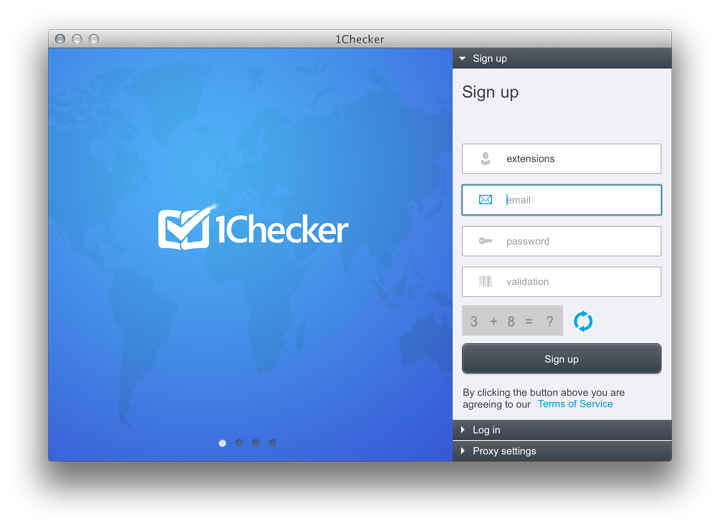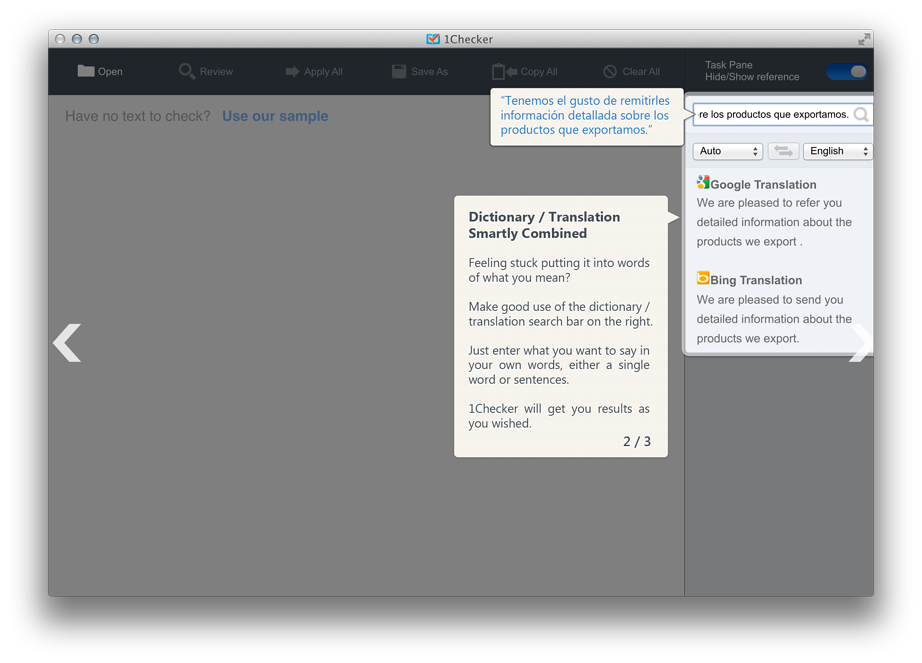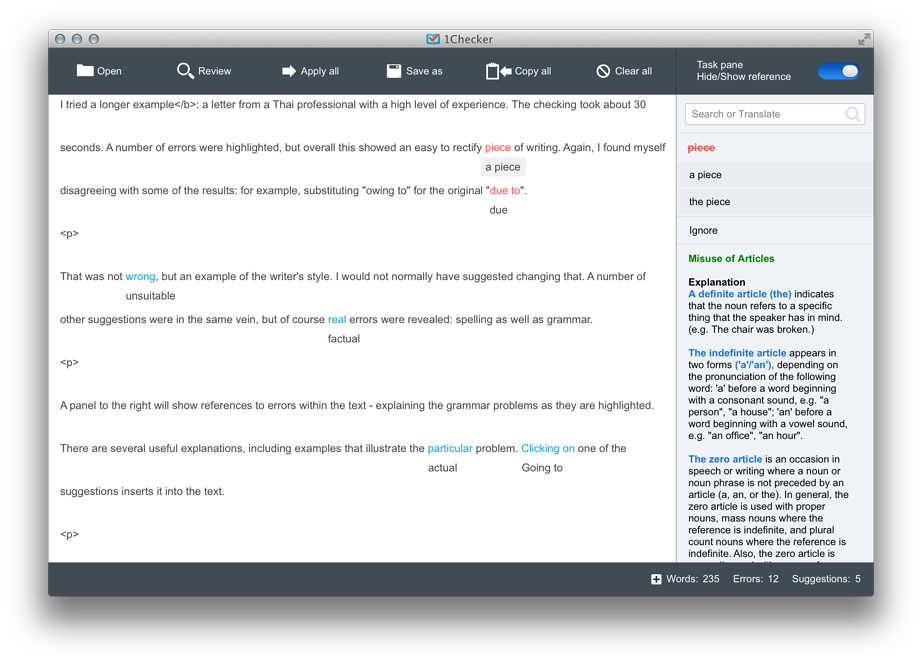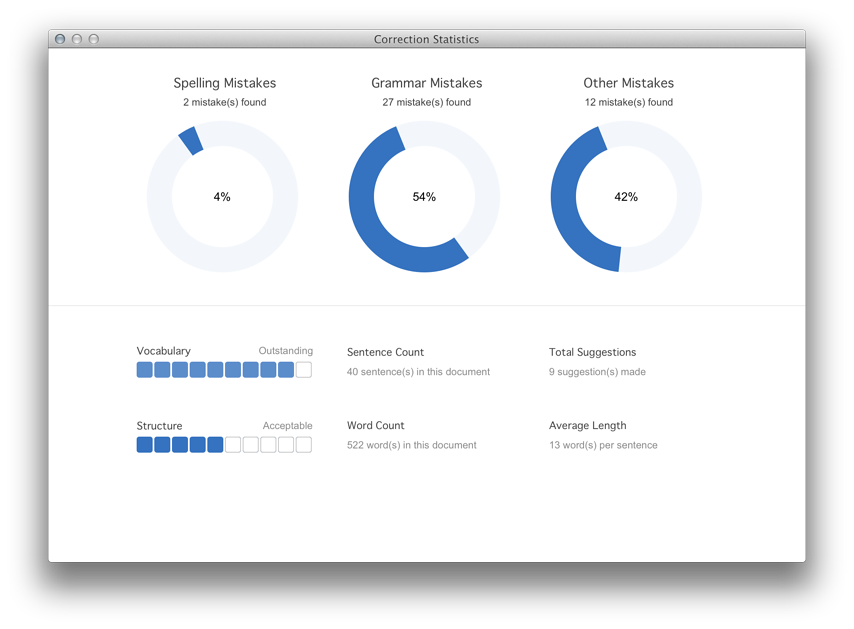Grammar Checking with an Application: 1Checker - Perhaps not the Solution I had Hoped

AMITIAE - Tuesday 14 January 2014
|
Grammar Checking with an Application: 1Checker - Perhaps not the Solution I had Hoped |
 |
|
|
By Graham K. Rogers
That they can in the end, is no testament to the teachers who went before me. If they would just remember . . .
. . . their writing would improve dramatically. Add to that some more vocabulary along with a bit less copying from outside sources and the results would be dramatic. Alternatively, there is always my big (metaphorical) stick that also works wonders.
The application she was suggesting is 1Checker which appears to have been developed by the University of Cambridge (which College I wonder, as Cantab is a bit big) and picked up by Greedy Intelligence. It is a free grammar and spelling checker. I am not sure how this is supported as there are no advertisements in the application and no fees when a user checks a piece of writing.

I completed the 1Checker registration. I normally hate to do this as it often means my details are entered on just one more mailing list and much wasted email will arrive in the next months.

I pasted some writing into the panel, but nothing happened until I clicked the next button at the top of the page: "Review." I am pleased to say that there were no grammar problems in my first attempt, but the use of a capital (upper case) letter at the beginning of "validate" was highlighted. As this is the name of a box, it is a proper noun, so in English needs to be capitalised. A person editing would have grasped the context. I then pasted in the three short paragraphs above - an early draft of the item - and one spelling mistake was found (I missed the "h" from "had") and a grammar error with a missing comma before the use of "but". There were a couple word choice errors, but I am not convinced that these were wrong in the context of this article. Another example from this text was also checked and a couple of errors were found, although I do not think that - in the context - one of these was an error. Several other word choice problems were highlighted (in blue), but some of these are not wrong in the way they are being used (e.g. "Clicking on" which 1Checker suggests should be "going to).

That was not wrong, but an example of the writer's style. I would not normally have suggested changing that. A number of other suggestions were in the same vein, but of course real errors were revealed: spelling as well as grammar. A panel to the right will show references to errors within the text - explaining the grammar problems as they are highlighted. There are several useful explanations, including examples that illustrate the particular problem. Clicking on one of the suggestions inserts it into the text. As well as pasting text into the panel, an Open button at top left allows the user to insert a file that can be checked. Other buttons include Apply all, Save as, Copy all (to the clipboard) and Clear all. The option to Apply all is active only after the Review has been accessed and will change all perceived errors to the corrections offered. This may not suit everyone and I would suggest a careful review of some of these as they may not suit all writers.

All of the examples I had checked were fairly simple examples of texts that were close to being correct and written by a native speaker or a Thai with graduate experience. These were nothing like the Th-English that my students offer me. I first tried with some simple examples that the students might offer:
These were not found to be wrong by 1Checker and I would dispute that. I then took a piece of Thai writing from the Matichon newspaper and entered that in Google Translate. This is after all, what some of my students try to do (easy to catch). The output from Google Translate was not unlike the sort of writing I am given at the early stages of the writing process. A number of errors were found, including several from my list (above). Some were not found, including one because 1Checker was unable to recognise the name of the Prime Minister: the suggestion was "influx". However, there were several clear errors that were not identified, including "I was 65 years old would not be treason to death outside" and "Tried to talks by saying that if anything, it has negotiated."
This is a fairly reasonable solution to the complex question of grammar-checking, but some decisions did not take full account of the writer's style or of the context of the text. A native speaker whose output has a few problems in a first draft, would benefit from such an applications. However, it not really heavyweight enough for the writing of my Thai students. Other non-native writers may also not benefit. The complexities that are in the text are translation-generated in many cases and the algorithms are probably not yet powerful enough for the unusual output this brings.
Graham K. Rogers teaches at the Faculty of Engineering, Mahidol University in Thailand where he is also Assistant Dean. He wrote in the Bangkok Post, Database supplement on IT subjects. For the last seven years of Database he wrote a column on Apple and Macs. |
|

For further information, e-mail to

|

|